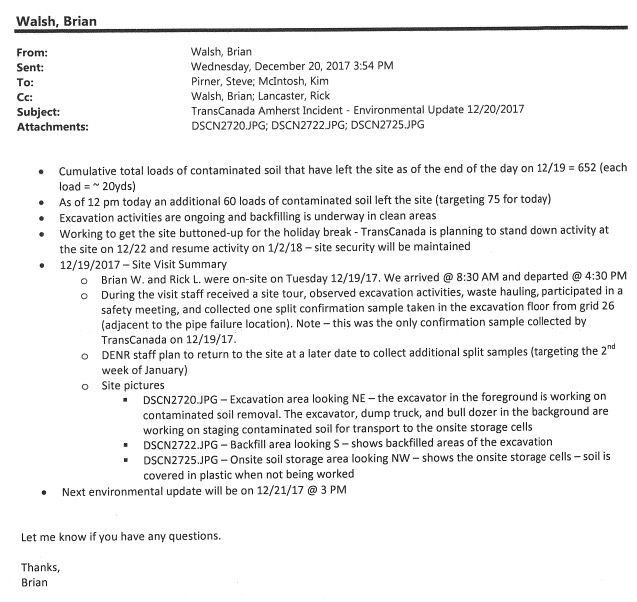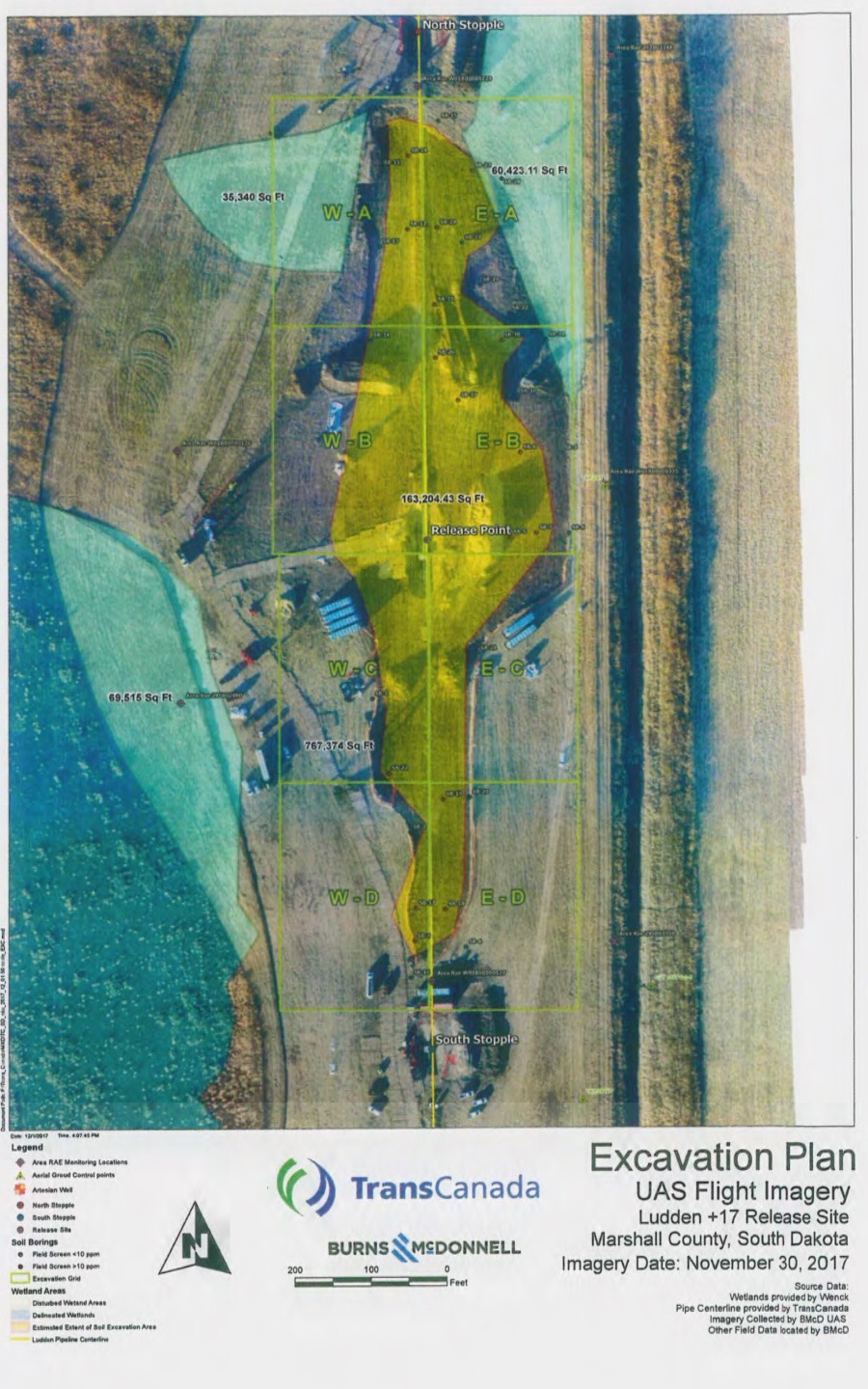TransCanada’s clean-up of its 5,000-barrel oil spill from the Keystone pipeline is going so well it can send everyone but its rent-a-cops home for Christmas and New Year’s. According to updates from Department of Environment and Natural Resources groundwater quality team leader Brian Walsh, TransCanada plans to stand down activity at the Marshall County spill site tomorrow (Friday, December 22). They’ll bring their excavators back on January 2 to clean up the remaining oil-contaminated soil.

As of noon Wednesday, TransCanada had moved 712 truckloads of oil-contaminated soil, or approximately 14,000 cubic yards. For comparison, if you had a typical city block (assume 16 blocks per mile) with no houses on it and scooped out all the dirt on that block to a depth of three feet, you’d have a bit more than 12,000 cubic yards of dirt.

What is that big blue area on the bottom left half of the map? Could that be a lake of some type?
Okay, but most SD towns have 12 blocks per mile. Regardless.
Now compute for us the agricultural productivity lost with the absence of that top soil. What was the predominant crop here? hay? pasture? corn? beans? and for how many years is the crop lost? how many years is the crop production reduced? If there are any real “producers” left in the house they want to know. If for no other reason than to correct extract payments the next time an energy company “draws a line on a map” that does not run down an existing infrastructure right-of-way.
There ought to be an accountant in Britton or in the SDSU ag department that could ‘do the numbers’ on a cocktail napkin.
Needing and getting energy is one thing; acquiring it recklessly and irresponsibly is another.
Time for Dennie D to tell them “Fine, but every day of delay will cost $100K. Merry Christmas.”
John,
Would you rather have the oil pass by your house in a train?
In a perfect world, Jason, trains and pipelines would all run through your property. Foreign korporations could come in and take your land and pay you what they think it is worth. Why not just volunteer if this is such a grand idea?
I’d rather we use less oil and more renewable resources so that oil can stay in the ground for future emergencies. Or I’d rather have the oil pass through my state on land not seized under threat of eminent domain, managed by a company that pays substantial federal and state pipeline risk taxes to guarantee clean-up and restitution for affected landowners.
Don’t fall for the false dilemma.
And John, here in Aberdeen, city blocks are pretty close to 16 per mile, running north–south. But whatever your block size, I’d love to see that ag productivity calculation for the lost topsoil. I hear from Kristi Noem they’re not making any more land….
How would John Q Citizen go about determining whether Trash-Can is paying the 9 pennies per gallon cleanup tax on this crude oil?
Cory,
You do realize that electric care use mostly coal to run right?
Cory,
Would you rather have a train of oil go by your house or in a pipeline in the ground?
Mike,
Are you unable to discuss issues as an adult? You are acting like a child.
I am a child, of the only universe you or I will ever see. Unlike you, I’d like to hang on to it for awhile longer.
If you are so in favor, let them use your ground. Or are you afraid of a spill or trainwreck in your little world?
I have Grands and a Great Grand. I would like to leave them an Earth somewhat better than I had. Apparently you don’t.
Jason, do you think that big red R behind yer name will protect you when the next pipeline is built? If they want what you have, they will get it and you will be beside yerself with grief wondering how can your America allow your property to be taken by a foreign entity for their benefit alone. Because of you and others like you, this happens frequently. Maybe Mickelson will decide you need a bigly CAFO shoved up your nose. Try and stop him.
Jason writes: “You do realize that electric care use mostly coal to run right?”
Wrong again, Jason. Coal provides 30% of our nation’s electrical power.
https://www.eia.gov/energyexplained/index.cfm?page=electricity_in_the_united_states
It’s time for Jason to repeat his question.
FoxNews says we’re making lots of new land. *Kristie … keep up.
http://www.foxnews.com/politics/2015/08/21/defense-official-china-grabs-50-percent-more-land-through-man-made-islands.html
Jason nice false choice.
I’d rather that most of the energy come from solar, geothermal, or wind. Many (most) new corporate buildings now opt for geothermal. I retro-fit my house for it. My gas bill is $14-16, little more than the monthly hook-up fee. I’m working at reducing my electric bill – but a north-face makes it challenging for solar with present technology. But if Germany, averaging on the 50th parallel can do it – then so can SD on the 44th parallel. If we need pipelines, they need to be in existing infrastructure corridors – not allowing every darn new engineer to draw their own line across public and private property. Think big or go home.
Cory, yes, across America the number of city blocks per mile can vary from 8 to 20. Perhaps Aberdeen – also through her streets – is a tad constipated (north of US12, 6th Ave, 16 blocks per mile, south of 6th Ave, 12 blocks per mile). Consider reviewing maps or aerial photos for most SD towns. They reveal that, on average, every 12th street aligns with the section lines feeding in and out of town ((Brookings, Watertown, Huron, Redfield, etc.), Mitchell and Madison appear as on a 13-grid)). There are exceptions.
https://en.wikipedia.org/wiki/Grid_plan
Jason writes: “Cory, Would you rather have a train of oil go by your house or in a pipeline in the ground?”
Cory, I didn’t know trains traveled in pipelines, but I would choose to have the train of oil go in a pipeline in the ground rather than by my house if those are the two choices. ;-)
Darin,
You don’t know trains carry oil?
You need to get out more. They even cause explosions and fire. Do you need me to link this for you?
Why do you think buffet was against pipelines?
The answer is he owns the trains.
Pipelines are the safest way to transport oil. That is a fact.
Have any of you stepped up to the plate and denounced all oil usage?
Keep in mind that involves not using plastic.
Jason, I think the entire American economy has been stepping up and demanding less usage of oil. The Great Recession brought a decline in U.S. oil consumption greater than the total capacity of Keystone 1 and projected Keystone XL combined.
Now if you’ll excuse me, I think I’ll ride my bike out to do some last-minute Christmas shopping.
EPA under Drumpf is worse than you can even make up- https://www.rawstory.com/2017/12/rachel-maddow-rips-disgraced-oklahoma-banker-who-immaculately-conceived-report-on-toxically-polluted-super-sites/
No meetings, no minutes, no records- nothing.
Cory,
Congrats on riding your bike. I hope you don’t freeze to death. I’m going to use my car so my kids don’t freeze to death when I travel today.
Businesses use a lot of oil so when the great recession occurred, the demand went down. The American economy has not been demanding less oil usage.
Mike,
Let’s talk about the corrupt EPA.
EPA Under Fire for Concealing Controversial Scientific Data, Silencing Skeptics
http://dailysignal.com/2015/02/11/epa-fire-concealing-controversial-scientific-data-silencing-skeptics/
revealing the scope of the scandal in in a report titled, “EPA’s Playbook Unveiled: A Story of Fraud, Deceit and Secret Science.”
I haven’t read the report yet, but I will.
Then we can discuss it.
Cory,
I am all for using less oil if you can.
I just read the article you linked. It basically said people couldn’t afford to drive and the vehicles are getting better gas mileage.
People still need oil and the safest way to transport it is pipelines.
O.K., try this one:
https://www.eia.gov/outlooks/aeo/pdf/0383(2017).pdf
U.S. domestic oil demand fluctuates but stay close to where it is now, below the Bush 2 peak, for the next 20 years.
I’m glad we agree that using less oil is a good thing. Alleviating the need for more leaky pipelines and deraily oil trains is a good reason to keep driving that demand down and to look for other ways to power our lives.
And whether the oilers spill their allegedly necessary evil from a pipeline or a train, I expect them to clean up their messes as quickly as possible. When your oil pipeline leaks because of your construction error, you forfeit your Christmas break.